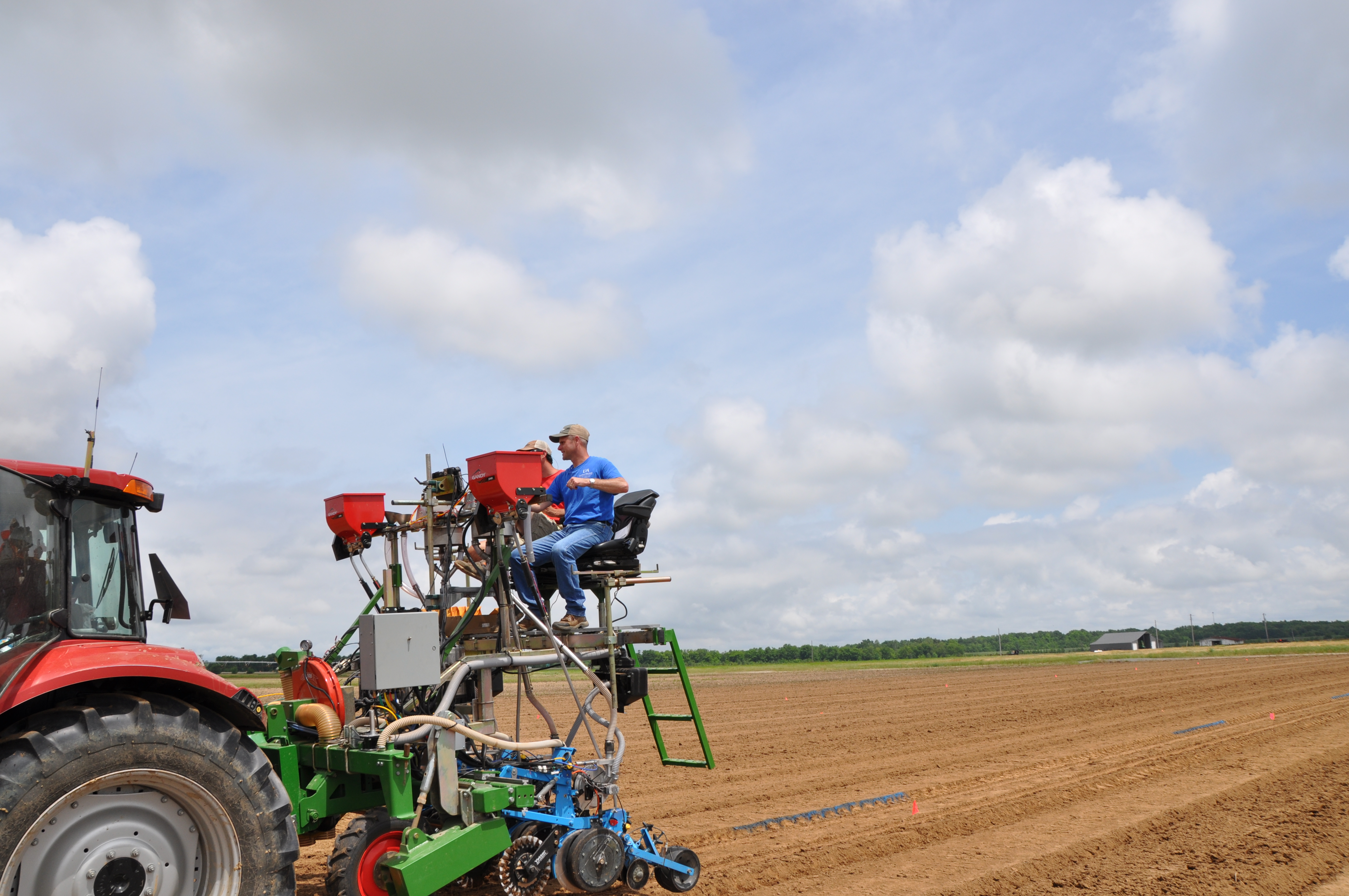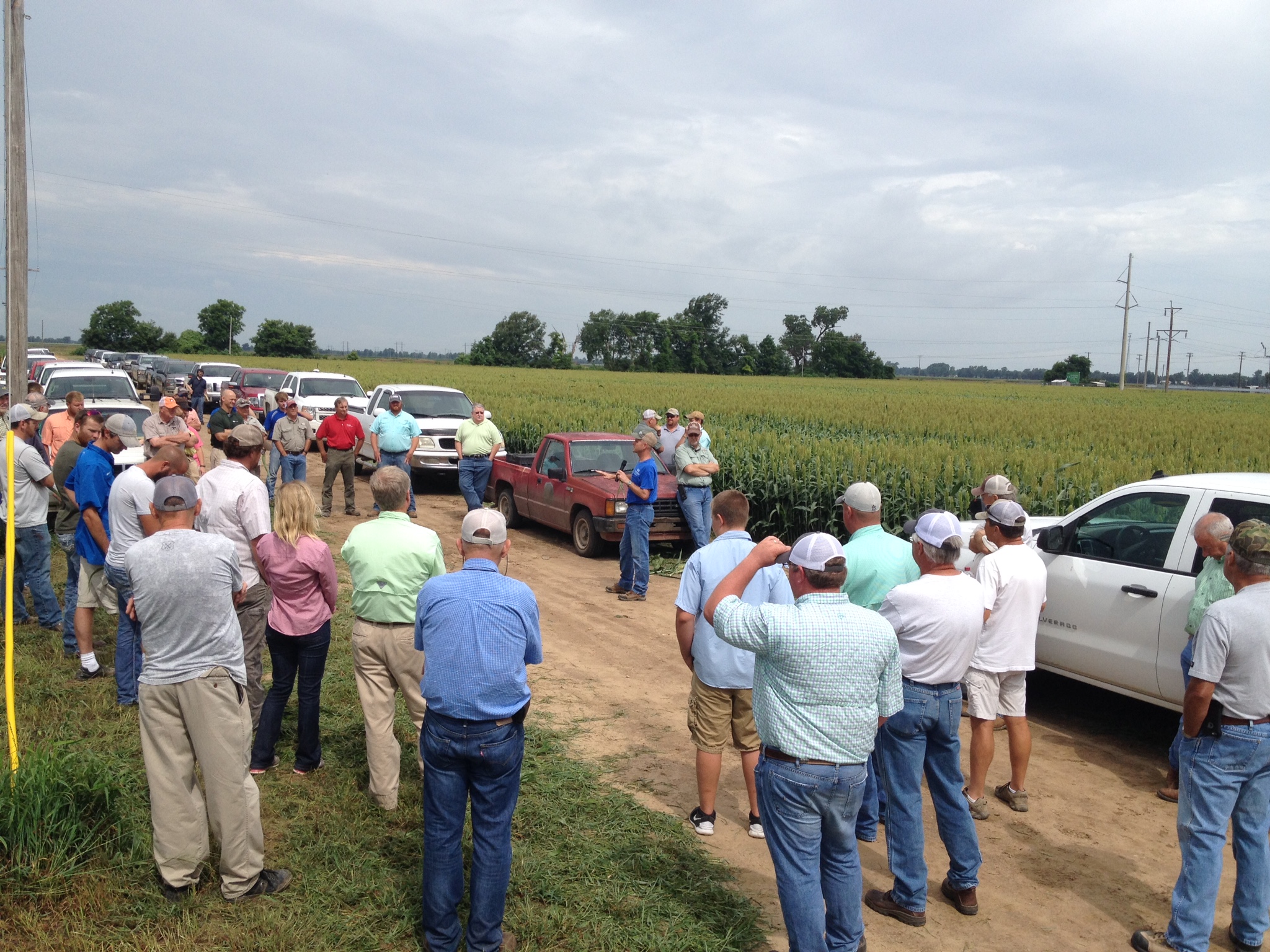Time in that position: 4 yrs (Assistant + Associate)
Distribution of efforts: 100% extension
Degree held, thesis/dissertation topic: PhD with an emphasis on seed treatments for plant-parasitic nematodes
Current commodity assignment: Soybean, corn, cotton, peanut
Typical workload in spring: 
The spring season begins with several planning meetings to discuss upcoming field, greenhouse, and lab experiments. Plant-parasitic nematode trials are conducted in grower fields, which require good planning and communication with the grower. Typically, our nematode trials are in soybean and cotton, which may be at one or two locations across the state. We also have several nematode trials that are conducted in the greenhouse. Similarly, we have numerous foliar fungicide trials in soybean and corn, which are planted in the spring and are often in two to three locations, either grower’s fields or at the Newport Extension station.
Typical workload in summer:
In the summer, as environmental conditions favor disease, some trials are inoculated, while others are treated with fungicides. Data collection continues from processing root and soil samples to determine the effect of treatment on nematodes to rating plots for disease. Most trials are rated weekly or biweekly throughout summer. Important disease issues are posted on the blog and discussed at county field days. Time is also spent preparing students for upcoming professional meetings.
Typical workload in fall:
Data collection on disease development continues in the early fall, and harvest begins for some corn trials. Peanut diseases pick up during the fall, and some late-season soybean diseases like soybean rust are beginning to show up in the state. Soybean harvest begins, followed by peanut and cotton trials, which are often the last to harvest in late October. Now the writing begins, from reports to summarizing field trials for chemical companies or proposals for various funding agencies.
Typical workload in winter:
In the winter months, data analysis continues, and presentations are prepared for the upcoming production-meeting season. These county production meetings begin in January and end in early March across the entire state. Disease updates and product information from the previous year’s experiments are provided to growers so they can make decisions on fungicide/nematicide purchases for the upcoming cropping season. Some professional meetings occur during this season, but in late March there is a brief calm before the planning and planting season, which is a good time to work on a manuscript.
Most rewarding thing about working in Extension:
A rewarding part of Extension is my interaction with growers and consultants, and how my education program influences their view of disease management. It is not uncommon for a consultant to say “… I remember you said at a meeting…” or “… I read in your article...” thus, my education program got them thinking about a particular approach or decision they made for disease control. One of my favorite pastimes is photography and using good quality photos in my educational programs is very rewarding, especially when a photo helps others to visualize or identify a specific disease. 
Challenges with Extension work; what early career professionals need to know:
One of the main challenges in Extension is to balance time between work and family. There is a lot of need in Extension, need to be part of a program, need to help a grower, need for impact… and the list goes on and on. But burn out is a real thing, and if it happens early, it can have a significant impact on your career. It is true that Extension requires a lot of time, but it gets easier as you become more comfortable in your program. After a few years take a step back and evaluate which activities are the most fruitful and which are not providing you the output you need for promotion. These less fruitful programs need to be trimmed from your program to allow more time with family and activities that provide measurable outcomes for your promotion. Finally, know your distribution of effort as Extension, research, or teaching, and make sure your program is addressing those efforts associated with your job description. Too often the research training takes over because you just finished a post-doc or doctoral degree, but if your job is heavy on Extension, make sure your measurable outcomes are heavy in Extension.
Put into context the way Extension is evaluated at your institution:
Extension is part of the division of agriculture; however, the headquarters for Extension is located in Little Rock, while the headquarters for research is located on campus in Fayetteville. All of the major row crop production is in the eastern half of the state so, Extension is strategically located to address the needs of the producers. The promotion process is the same, but Extension scientists do not receive tenure. Currently, tenure is awarded through the University of Arkansas for those with a certain percentage of teaching rather than research or Extension.
Advice to graduate students and early career professionals who want to pursue a career in Extension:
Do it! There is a high demand for those interested in pursuing a degree in applied research and Extension. Almost all of our graduates find job placement before graduation within academia or the seed/chemical industry. If you are interested, identify a mentor that has an applied program and he/she can guide you through the steps needed to meet the needs of academia or the agricultural industry in general. Extension scientists play a major role in applied research, which is what interested me in plant pathology, but the role of applied research extends beyond Extension. Thus, the opportunities are excellent for those interested in this field.
